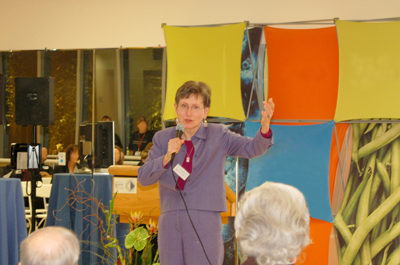We are the key to our own recoveries!
Teaching
We are the key to our own recoveries.
We can learn how to make a difference in our own lives.
We teach people with neurological injuries and illnesses, family members and friends, care-providers, seniors, and the general public. Here are examples of some of what we teach.
Mindfulness and Brain Injury Recovery
Our teaching is founded in the practice of mindfulness. Practicing the skills of focused, non-judgmental attention supports recovery and improves quality of life for survivors and their loved ones. Our Mindful Recovery Course is designed specifically for survivors and their loved ones. The course is taught in an 8-week series and weaves together mindfulness teaching and recovery training.
Recovery Strategies Class
This class is designed for survivors and family members and is most often taught in acute rehabilitation settings. The class is full of insight, hope, humor and warmth, and brings both comfort and useful information. Through storytelling and examples, we talk about various aspects of recovery and the process of reclaiming our lives: Some of the topics are: everything we do is therapy; intention and attention; creativity and novelty; working with neuroplasticity and learned non-use; kindness and self-care; and valuing our families and our friends.
Befriending Ourselves Classes
This is a class series designed for survivors and family members who are out of acute rehab and continuing to work with recovery. Classes are interactive and encourage teaching one another. Each series is adapted to meet the concerns of the participants and may include:
- Turning Towards – Recovery is empowered by how we manage ourselves.
- Kindness and Self-Compassion – We learn to help ourselves through kindness.
- Neuroplasticity and Learned Non-Use – Learning how the brain heals is vital.
- Understanding Each Other – Communication is essential, with our without words.
- The Power of Attention – Attention shapes the brain and can be taught.
- Laughter and Play – Keeping a sense of humor promotes creativity and recovery.
- Cultivating Persistence – The path of recovery does not stop unless we stop.
- The Art of the Small Goal – The brain rewires in small steps.
- Living Around Limitations – Creativity and letting life in support recovery.
- Mindful Movement – Based on the principles of Feldenkrais we learn to move with awareness.
Care Provider Training
We provide talks and training for professional care providers, speaking in hospitals and clinics and at professional meetings, discussing many issues including: the affect of care-providers on patients’ internal narratives about recovery; the affect of care-providers on patients’ capacity for sustained self-awareness and attention; and teaching patients mindfulness and mindful movement.
CNA and RNA training
Survivors are often sent to skilled nursing facilities. The greatest day-to-day contact in those facilities for survivors is usually with their CNAs and RNAs. Developed in connection with a beautiful retirement community in California, these courses are designed to improve the quality of care provided.
The Vital Role of the CNA and RNA – Insight into the impact of these care professionals on patients, recovery outcomes and adaptation is critical to CNAs’ and RNAs’ success and survivors’ well being.
Neuroplasticity and Learned-Non-Use – Knowledge of these concepts help CNAs and RNAs support understanding and discovery by survivors.
Internal Narratives –Understanding how to help patients create positive new stories supports recovery.
Listening and Communicating – Words can be a challenge for survivors. Learning to slow down and listen with the heart and to communicate with touch, gesture and expression as well as words improves relationships between care-providers and patients.
Overstimulation – Some disabilities post brain injury are hidden. One of them is sensitivity to stimulation. Nursing home environments can be highly stimulating. Understanding the impact of this stimulation on patients teaches CNAs and RNAs how to help patients develop strategies to manage.

Alison teaching at Kaiser
Endorsements
“Alison has a rare gift – the ability to articulate her experience with humor and passion. She seems a natural public speaker….People are drawn to her – all people. Survivors, professionals, and caregivers alike.”
− Patricia Gill, M.S., Executive Director
Marin Brain Injury Network
“Alison skillfully blends direct experience, personal and scientific knowledge, deep thoughtful insights, her sense of humor, and her will to live to tell a compelling story.”
William B. Stewart, M. D., Medical Director
Institute for Health & Healing
California Pacific Medical Center
“Her ability to understand issues of recovery and teach specific approaches to help survivors work with those issues after leaving in-patient rehabilitation is invaluable. Alison’s compassion for the people with whom she shares her story allows her to connect with her audience in a way that transforms the experience of stroke recovery. Patients report how much hearing her speak has helped them.”
Michelle Camicia, MSN. CRRN.
Director of Operations
Kaiser Foundation Rehabilitation Center
